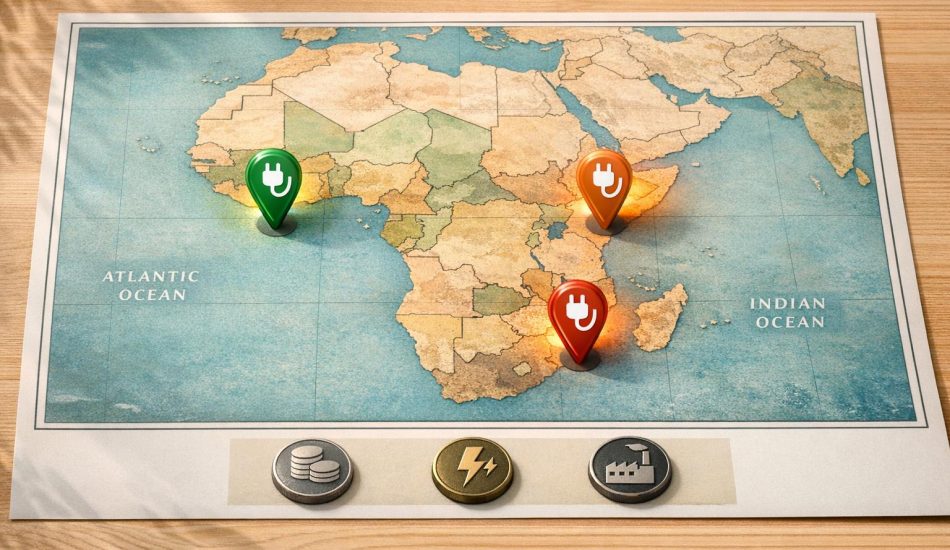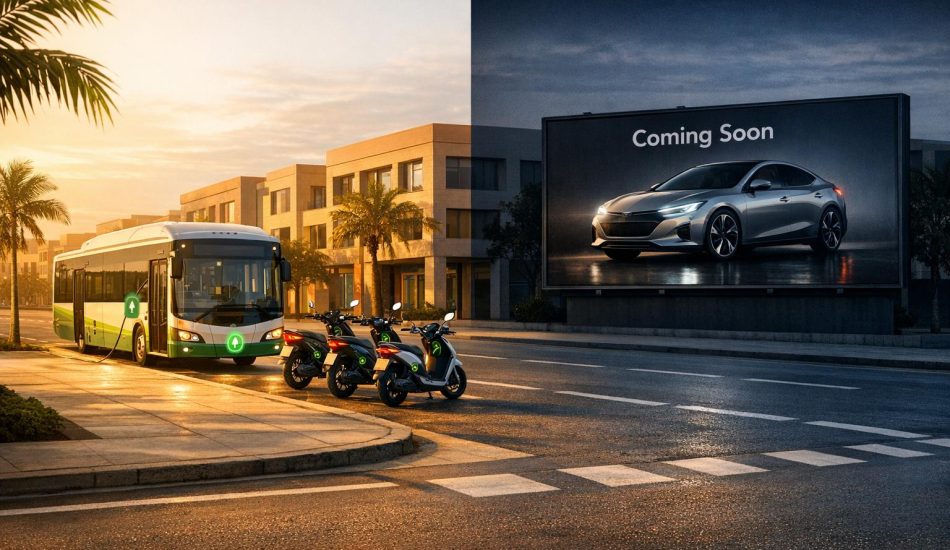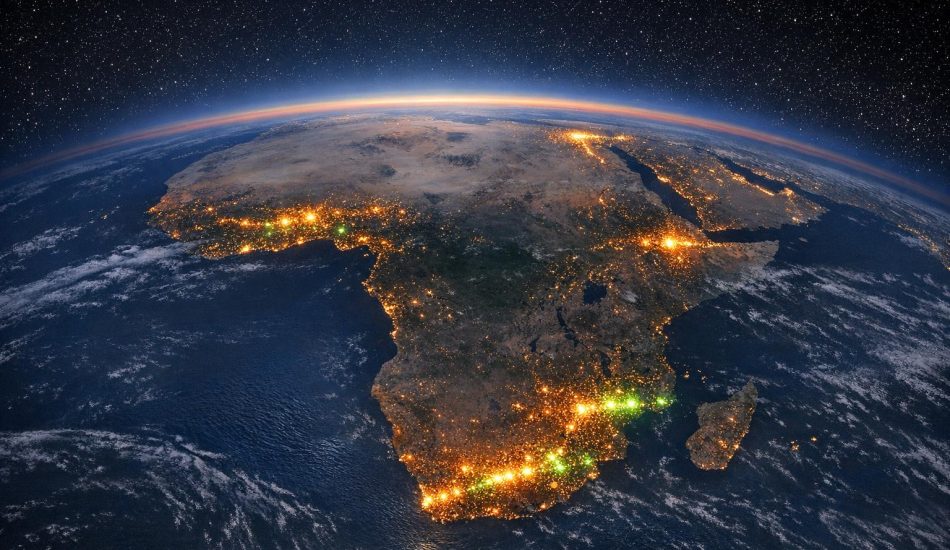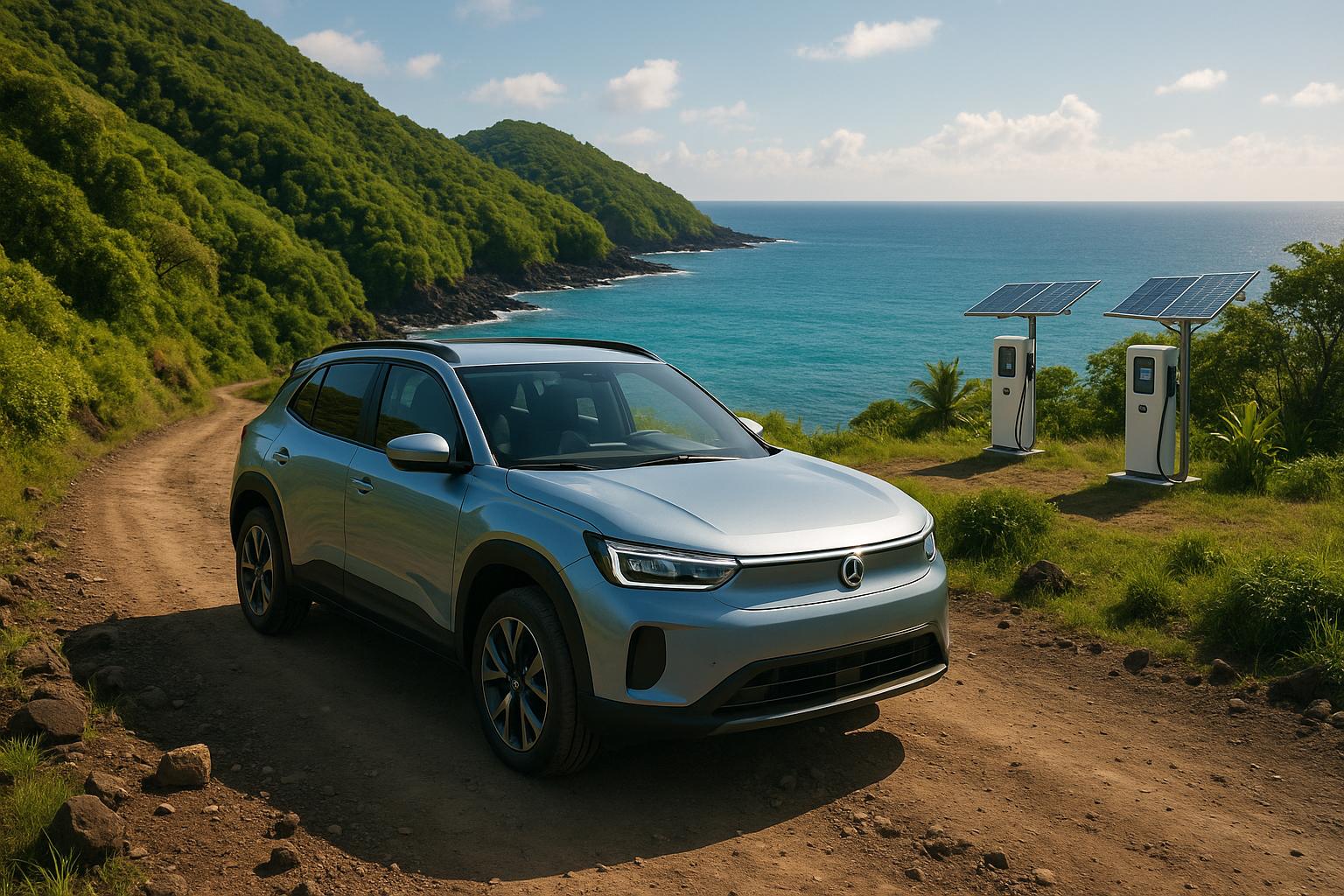
Switching to an electric vehicle (EV) in Comoros can save money on fuel, reduce emissions, and handle the island’s short travel distances. Here’s what you need to know:
- Best EVs for Comoros: Options range from budget-friendly models like the Geely Panda Mini ($5,880) to high-performance choices like the BYD Tang EV 2024 ($34,700). Key features to look for: high ground clearance, AWD/4WD, and robust suspension for rugged roads.
- Charging & Maintenance: Install a home charger (Level 2 recommended) due to limited public chargers. Protect your EV’s battery from heat by parking in shaded areas and avoiding frequent fast charging.
- Buying Process: Platforms like EV24.africa simplify EV purchases with financing options, shipping to Comoros, and full import assistance. Delivery takes 4–8 weeks.
| Model | Price | Range | Best For |
|---|---|---|---|
| Geely Panda Mini Base | $5,880 | 75 miles | Urban |
| BYD Yuan Pro | $10,880 | 186 miles | First EV |
| BYD Song Plus EV | $18,680 | 314 miles | Family |
| Leapmotor C10 | $18,900 | 280 miles | Versatile |
| BYD Tang EV 2024 | $34,700 | 454 miles | Capable |
| Leapmotor C11 Perf. | $31,300 | 342 miles | Sporty |
Start by choosing the right EV for your needs, set up a reliable charging system, and take steps to maintain battery health in Comoros’ tropical climate. Visit EV24.africa for personalized quotes and support.
The EV Revolution No One Saw Coming
Key Factors for Choosing an EV in Comoros
Selecting the right electric vehicle (EV) for Comoros means considering the island’s rugged terrain, tropical weather, and limited infrastructure. These factors play a critical role in determining which EV best suits the unique challenges of this environment.
Checking Terrain Compatibility
Ground clearance is arguably the most important feature to look for when navigating Comoros’ roads. With many routes being unpaved or poorly maintained, a vehicle with high ground clearance is essential to avoid damaging the undercarriage. For example, the Munro MK_1 offers an impressive clearance of 18.9 inches (480mm).
Another key feature is a robust suspension system tailored for off-road conditions. Unlike traditional vehicles, EVs have the advantage of independent wheel control through advanced computerized systems. This precise control is a game-changer for handling uneven terrain, as it minimizes damage and enhances safety.
"EVs are superior in terms of torque delivery — that’s the beauty of an EV. Off-roading is all about maximizing torque." – Brandon Girmus, Product Planning Manager at Jeep
Underbody protection is also crucial in Comoros’ challenging landscape. Look for EVs equipped with skid plates or similar systems to shield the battery and other critical components from rocks, debris, and rough surfaces. Compact motor designs in EVs further enhance this protection.
For improved traction on loose surfaces, steep inclines, or during the rainy season, consider EVs with all-wheel drive (AWD) or four-wheel drive (4WD). Pairing these systems with all-terrain tires ensures better grip on a variety of road conditions.
Once you’ve confirmed that an EV can handle the terrain, it’s time to evaluate its range and charging capabilities.
Battery Range and Charging Requirements
Comoros’ relatively short travel distances make EV use more practical. Daily commutes on the island typically fall well within the range of most modern EVs, many of which can travel over 248 miles (400km) on a single charge. This minimizes concerns about range anxiety compared to larger countries.
Given the limited public charging infrastructure, installing a home charger is a smart move if you have private parking. Most EV owners charge their vehicles at home, which simplifies the transition to electric driving.
Take advantage of Comoros’ renewable energy potential. The island’s abundant solar energy resources provide an opportunity to power your EV with clean, locally-produced electricity. This not only reduces reliance on imported fuels but also lowers operating costs.
Planning for backup charging options is also essential. While public charging networks are expanding across Africa, mapping out alternative charging locations along your regular routes ensures you’re prepared for any situation. Modern mobile apps and in-car navigation systems make it easier than ever to locate nearby charging stations.
Maintenance and Local Service Support
Beyond performance, reliable maintenance and service options are key to keeping your EV running smoothly in Comoros.
Check the availability of parts and local service centers before purchasing an EV. While EVs generally require less maintenance than traditional gas-powered vehicles – thanks to fewer moving parts – they still need occasional servicing. On average, EV maintenance costs can be about one-third of what you’d spend on a gasoline car.
In tropical climates like Comoros, thermal and cooling systems are particularly important for preserving battery performance. High temperatures can negatively impact battery efficiency and lifespan, so selecting models with advanced cooling systems is essential.
"We’re showing customers that EVs can do just about anything", – Donna Dickson, Chief Engineer of the Mach-E Rally, Ford
Look for EVs with extended battery warranties to protect against potential degradation in the island’s hot and humid conditions. Many manufacturers offer comprehensive warranties, but it’s worth double-checking the terms to ensure they cover tropical environments.
EVs also reduce the need for brake maintenance thanks to regenerative braking systems. Unlike traditional friction brakes, regenerative braking significantly reduces wear on brake pads and rotors, allowing them to last much longer and cutting down on maintenance costs.
Finally, adopt smart charging habits to extend battery life in tropical climates. Avoid charging to 100% regularly and try not to let the battery fully deplete. While fast chargers are convenient, they can accelerate battery wear, so slower charging options (120- or 240-volt) are better for long-term battery health. In Comoros’ climate, these practices can make a noticeable difference in maintaining your EV’s performance.
Best EV Models for Island Roads
When it comes to navigating rugged terrain and tropical climates, certain EV models stand out as excellent choices. EV24.africa offers several options that are particularly well-suited for island driving.
Top Models from EV24.africa
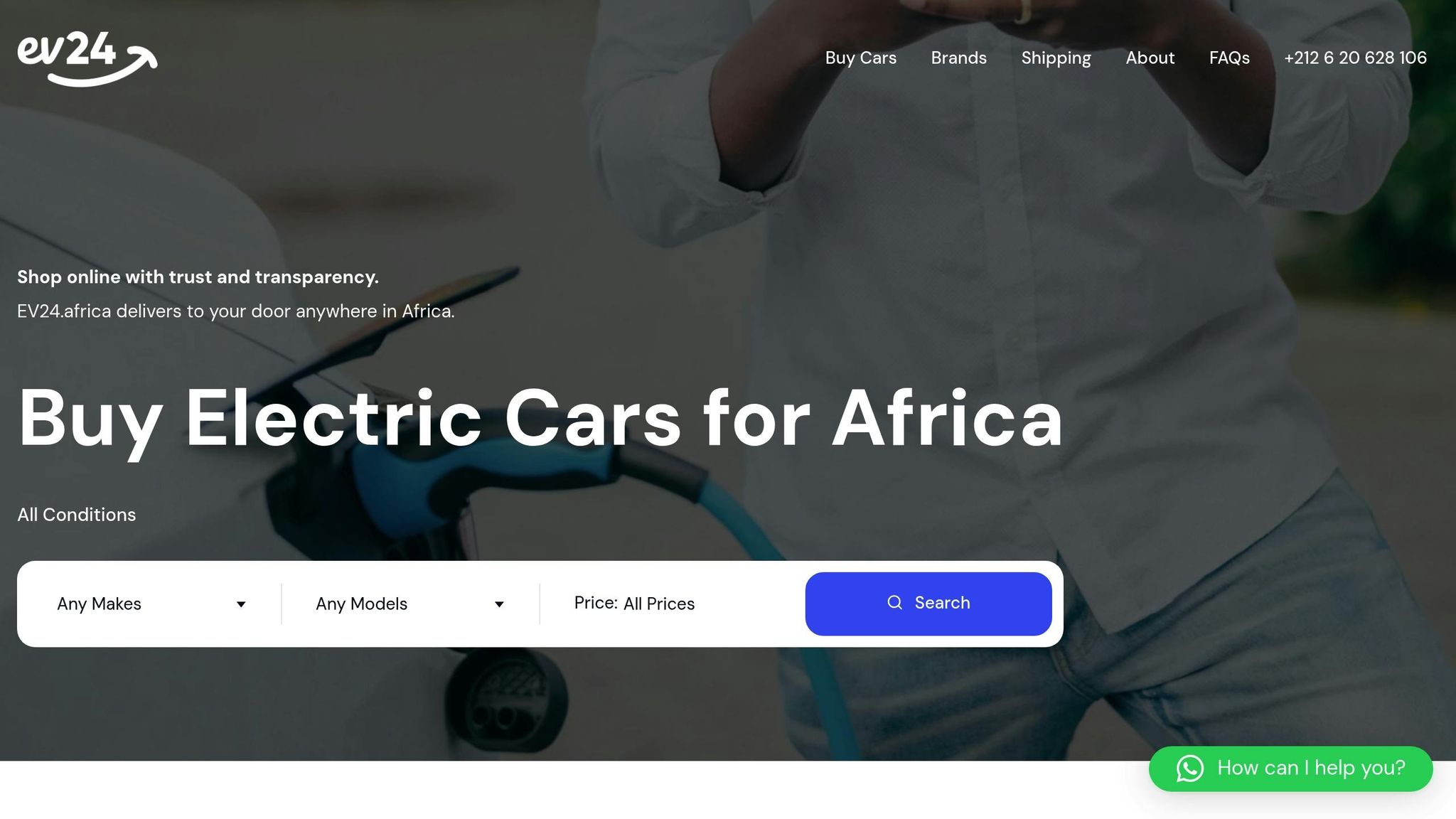
Compact and Budget-Friendly Choices
The BYD Yuan Pro is an excellent pick for first-time EV buyers, priced at $10,880. With a range of 186 miles (300 km), it provides just the right balance of affordability and performance for everyday island travel. Its compact SUV design makes it perfect for winding coastal roads and tighter spaces.
For those on a tighter budget, the Geely Panda Mini is a smart option, starting at just $5,880. While its base model offers a modest 75-mile (120 km) range, the upgraded version ($7,350) extends that to 124 miles (200 km), making it more versatile for short trips around the island.
Mid-Range SUVs with Extra Capability
The BYD Song Plus EV ($18,680) is a versatile SUV with a remarkable 314-mile (505 km) range. Its higher ground clearance makes it suitable for unpaved roads, while the spacious interior is ideal for families or transporting goods.
Another solid choice is the Leapmotor C10, priced at $18,900. With a range of 280 miles (450 km), it offers everyday practicality and the capability needed for diverse island driving conditions.
High-Performance Models
For those seeking the best in capability and performance, the BYD Tang EV 2024 ($34,700) is hard to beat. It boasts a range of 454 miles (730 km) and is built to tackle challenging terrain, including steep coastal routes and rural areas.
The Leapmotor C11 Performance ($31,300) combines a 342-mile (550 km) range with sport-tuned handling, making it a great choice for drivers who enjoy a dynamic driving experience on winding island roads.
| Model | Price | Range | Best For |
|---|---|---|---|
| Geely Panda Mini Base | $5,880 | 75 miles (120 km) | Urban |
| BYD Yuan Pro | $10,880 | 186 miles (300 km) | First EV |
| BYD Song Plus EV | $18,680 | 314 miles (505 km) | Family |
| Leapmotor C10 | $18,900 | 280 miles (450 km) | Versatile |
| BYD Tang EV 2024 | $34,700 | 454 miles (730 km) | Capable |
| Leapmotor C11 Performance | $31,300 | 342 miles (550 km) | Sporty |
Key Features for Island Driving
These EVs are designed to meet the specific challenges of island roads, from rough terrain to limited infrastructure. Here’s why they excel in places like Comoros:
Built to Last
Durability is a must for island vehicles, and these EVs are up to the task. They’re made with corrosion-resistant materials to withstand the salty air and high humidity typical of tropical climates. Brands like BYD and Leapmotor ensure their vehicles are ready for such demanding environments.
Perfect for Tight Roads
Island roads are often narrow and winding, but these EVs handle them with ease. Their compact designs and the instant torque provided by electric motors make navigating sharp turns and steep inclines a breeze. This combination enhances both safety and control.
Regenerative Braking
Regenerative braking is a standout feature, helping to extend the vehicle’s range while reducing wear on the brake system. This is especially useful for frequent stop-and-go driving.
Flexible Charging Options
Charging infrastructure can be limited in some areas, but these models are prepared. They support a variety of charging methods, from standard household outlets to faster DC charging. This flexibility ensures you can keep your EV powered up no matter what’s available.
sbb-itb-99e19e3
Financing and Buying an EV in Comoros
Switching to an electric vehicle (EV) in Comoros doesn’t have to be a financial burden. EV24.africa has simplified the process, offering flexible payment plans and full support from purchase to delivery, making the transition to electric mobility smoother than ever.
Financing Options Made Simple
Electric vehicles can be pricey, but EV24.africa helps ease the cost by teaming up with financial institutions to provide leasing and loan options. Whether you’re an individual or a business, you can spread payments into manageable monthly installments.
Payment methods include bank transfers, mobile money, and even cryptocurrency, giving you flexibility and convenience.
While Comoros doesn’t currently offer significant government incentives for EV buyers, discussions are underway to secure funding and collaborate with international partners to support the sector’s growth. Until then, financing through EV24.africa’s partner institutions is the most practical choice.
How to Purchase Through EV24.africa
Once your financing is in place, buying your EV through EV24.africa is straightforward. They handle everything from helping you choose the right model to delivering it to your doorstep, taking the hassle out of importing a vehicle to Comoros.
1. Browsing and Selection
Start by browsing EV24.africa’s wide range of EVs from brands like Tesla, BYD, Volkswagen, XPeng, and Leapmotor. Each listing includes detailed specifications, clear pricing, and high-quality photos to help you make an informed decision.
Options range from budget-friendly models like the LINGBOX UNI for $4,800 to luxury vehicles like the VOYAH DREAMER EV priced at $97,000. All prices are transparent and include fees – just contact EV24.africa for details specific to Comoros.
2. Ordering and Payment
After selecting your EV, request a comprehensive quote covering the entire import process. This includes the vehicle price, shipping costs, insurance, and estimated customs duties for Comoros. EV24.africa uses Incoterms to ensure standardized and clear transactions.
Shipping options include economical RoRo (Roll-on/Roll-off) or container shipping for added protection. You can choose between port-to-port delivery (to the Port of Moroni) or door-to-door service, tailored to Comoros’ unique logistics needs.
3. Logistics and Delivery
EV24.africa takes care of all the paperwork, including customs clearance, registration, and import taxes, so you don’t have to.
Delivery times typically range from 4 to 8 weeks, depending on the shipping method and vehicle availability. You’ll also get real-time tracking updates to monitor your EV’s journey. Deliveries in Comoros are primarily handled through the Port of Moroni, ensuring smooth logistics for island customers.
Comprehensive Support Every Step of the Way
EV24.africa provides expert guidance on everything from model specifications to financing and import documentation. This level of support is especially useful for first-time EV buyers or those new to international vehicle purchases.
With flexible financing, end-to-end logistics support, and transparent pricing, EV24.africa is making it easier than ever for Comorians to embrace electric mobility.
EV Maintenance and Charging in Comoros
Owning an electric vehicle (EV) in Comoros comes with unique challenges, especially when it comes to charging and maintenance. The tropical climate and developing infrastructure mean EV owners need to plan carefully. However, with the right setup and consistent care, your EV can run efficiently for years on the islands.
Installing Home Charging
Given the limited availability of public charging stations in Comoros, having a home charging setup is almost a necessity. A reliable home charger ensures you can keep your EV powered without relying on scarce public facilities.
Choosing the Right Charger
For faster and more convenient charging, a Level 2 charger (240V) is your best bet. These chargers can fully replenish your battery overnight and typically cost between $500 and $2,000, not including installation. Considering Comoros’ tropical weather, it’s smart to invest in a charger that’s built to withstand heat and humidity.
Preparing for Installation
Before installing a charger, check if your home’s electrical system can handle the extra load. EV chargers generally require 3.3 kW to 19.2 kW, so consulting a certified electrician is essential. Many homes in Comoros may need an electrical panel upgrade to meet these requirements safely.
Professional Installation
Have a professional install the charger in a location that’s both accessible and shielded from the elements. Installation costs usually range from $799 to $1,999. While this may seem like a big upfront expense, the reliability of home charging makes it worthwhile for EV owners in Comoros.
Regular maintenance of your charger is also important to ensure safe and consistent operation.
Maintenance and Safety Tips
After severe weather, inspect your charger and its wiring for damage. The tropical climate can accelerate wear on electrical components, so routine checks are crucial. Additionally, managing your EV’s battery temperature is key to keeping your car running smoothly in Comoros.
Protecting Battery Life in Tropical Weather
The warm climate in Comoros can pose challenges for EV batteries, which are sensitive to high temperatures. Prolonged exposure to heat can reduce both battery performance and lifespan, so taking steps to protect your battery is essential.
How Heat Affects EV Batteries
EV batteries work best in temperatures between 68°F and 77°F (20°C and 25°C). In Comoros, where temperatures often exceed this range, batteries may lose efficiency. Studies show that at 80°F (26.7°C), range loss is about 2.8%, increasing to 5% at 90°F (32.2°C), and up to 31% at 100°F (37.8°C). Additionally, batteries in hot climates tend to have shorter lifespans – around 30 months compared to 51 months in cooler regions.
Excessive heat can also cause structural damage to the battery, reduce charging efficiency, and lengthen charge times.
Practical Tips for Battery Care
- Park Smart: Whenever possible, park in shaded areas to keep your EV cooler. If shade isn’t available, installing a carport or shade structure can help.
- Charge Wisely: Charge your EV during cooler times of the day, like early morning or evening. Pre-cooling your car while it’s plugged in can reduce the strain on the battery when using air conditioning. Also, try to keep the battery charged below 80% to minimize stress in hot conditions.
- Driving Habits: Limit air conditioning use, as it consumes extra battery power. Instead, use ventilation or lower the windows to cool the cabin before driving.
- Routine Checks: Regularly monitor your battery’s performance and inspect for signs of heat-related wear. Clean the battery area to prevent dirt buildup, which can trap heat. Proper tire pressure is also critical since under-inflated tires create more resistance, forcing the battery to work harder. If you notice slower charging or reduced range, have a technician inspect the battery system to address potential heat damage early.
The good news is that EVs generally retain about 95% of their range in temperatures up to 90°F (32.2°C), which covers most of the typical weather in Comoros. By following these strategies, you can ensure your EV continues to perform reliably despite the tropical challenges.
Conclusion: Starting Electric Mobility in Comoros
Transitioning to electric mobility in Comoros has never been more accessible, thanks to EV24.africa’s straightforward process. Success hinges on selecting the right EV for the island’s specific needs, setting up a reliable home charging system, and ensuring your vehicle is well-prepared for the tropical environment.
Begin with the basics. Choose an EV that matches Comoros’ diverse road conditions, offers sufficient battery range for your daily routine, and comes with accessible local service support.
Leverage EV24.africa’s all-in-one service. They provide delivery to major cities in Comoros and manage the entire import process, offering flexible options like DDP (Delivered Duty Paid) and FOB (Free on Board).
"At EV24.africa, customer satisfaction is our top priority."
Prepare for the tropical climate. As outlined in the maintenance section, keeping your EV’s battery protected from heat and setting up a dependable home charging system are essential steps. While high temperatures can impact EV performance, these vehicles are designed to handle the typical conditions in Comoros effectively.
Take the first step today by exploring EV24.africa’s available models and requesting a personalized quote. Consider both DDP and FOB import options to find the one that suits your budget and needs. Additionally, stay informed about potential tax incentives or government reforms that could help reduce the cost of ownership in the future.
FAQs
What should I look for when choosing an EV for Comoros’ tropical and rugged roads?
When choosing an EV for Comoros, it’s important to focus on features that can handle the island’s unique terrain and climate. High ground clearance and a durable suspension system are a must for navigating uneven or rugged roads. You’ll also want an EV with strong torque to tackle steep inclines and an efficient cooling system to cope with the tropical heat.
Given the limited charging infrastructure in some areas, a long battery range is critical. Models with fast-charging capabilities and batteries built to perform well in high temperatures are especially useful. If off-road adventures are on your agenda, consider options with adjustable suspension and all-wheel drive for added versatility. By focusing on these features, you’ll be better equipped to find an EV that meets the demands of the island’s environment.
How can I take care of my EV’s battery in Comoros’ hot climate?
To keep your EV’s battery in good shape in Comoros’ warm climate, try maintaining the charge level between 20% and 80% to avoid unnecessary stress on the battery. Whenever you can, park in shaded or covered areas instead of leaving your car in direct sunlight for extended periods. Also, try to limit how often you rely on rapid charging, as frequent use can lead to overheating and shorten the battery’s lifespan.
Another helpful tip is to use your EV’s preconditioning features to cool down the cabin and battery before you hit the road. Simple habits like these can go a long way in managing heat-related wear and keeping your battery running smoothly for years to come.
How can I set up a home charging station for my EV in Comoros?
To set up a home charging station for your EV in Comoros, the first step is to evaluate your home’s electrical system. This ensures it can handle the added demand of an EV charger. You might need to bring in a licensed electrician to inspect your setup and potentially upgrade your wiring.
Many EV owners opt for Level 2 chargers because they’re faster and more efficient than standard outlets. These chargers are usually mounted on a wall and require professional installation to ensure everything is done safely and complies with local regulations. Installation costs can vary widely, typically falling between $800 and $2,000, depending on your home’s existing electrical setup and any upgrades that might be necessary.
It’s also important to have off-street parking with easy access to your home’s electrical panel. This makes the installation process much smoother. Working with electricians who are familiar with Comoros’ infrastructure and regulations will help ensure your charging station is safe, reliable, and up to code.


